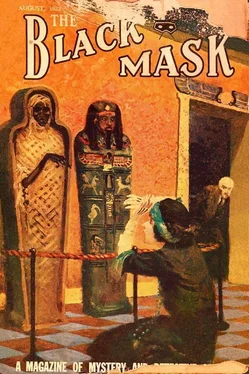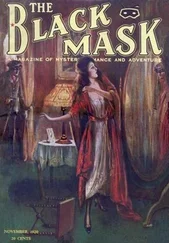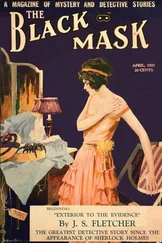John Baer - The Black Mask Magazine (Vol. 5, No. 5 — August 1922)
Здесь есть возможность читать онлайн «John Baer - The Black Mask Magazine (Vol. 5, No. 5 — August 1922)» весь текст электронной книги совершенно бесплатно (целиком полную версию без сокращений). В некоторых случаях можно слушать аудио, скачать через торрент в формате fb2 и присутствует краткое содержание. Город: New York, Год выпуска: 1922, Издательство: Pro-Distributors Publishing Company, Жанр: Детектив, на английском языке. Описание произведения, (предисловие) а так же отзывы посетителей доступны на портале библиотеки ЛибКат.
- Название:The Black Mask Magazine (Vol. 5, No. 5 — August 1922)
- Автор:
- Издательство:Pro-Distributors Publishing Company
- Жанр:
- Год:1922
- Город:New York
- ISBN:нет данных
- Рейтинг книги:4 / 5. Голосов: 1
-
Избранное:Добавить в избранное
- Отзывы:
-
Ваша оценка:
- 80
- 1
- 2
- 3
- 4
- 5
The Black Mask Magazine (Vol. 5, No. 5 — August 1922): краткое содержание, описание и аннотация
Предлагаем к чтению аннотацию, описание, краткое содержание или предисловие (зависит от того, что написал сам автор книги «The Black Mask Magazine (Vol. 5, No. 5 — August 1922)»). Если вы не нашли необходимую информацию о книге — напишите в комментариях, мы постараемся отыскать её.
The Black Mask Magazine (Vol. 5, No. 5 — August 1922) — читать онлайн бесплатно полную книгу (весь текст) целиком
Ниже представлен текст книги, разбитый по страницам. Система сохранения места последней прочитанной страницы, позволяет с удобством читать онлайн бесплатно книгу «The Black Mask Magazine (Vol. 5, No. 5 — August 1922)», без необходимости каждый раз заново искать на чём Вы остановились. Поставьте закладку, и сможете в любой момент перейти на страницу, на которой закончили чтение.
Интервал:
Закладка:
The clockmaker was ready for him, and the box itself was a beauty — as creditable a piece of work as Bruckner had ever seen. It did not weigh too much nor too little, and while he was assured that the watch was perfect in its mechanism and timing, it did not give forth the slightest sound.
The clockmaker beamed when he saw the look of admiration in Bruckner’s eyes and told him that he might trust the little bomb implicitly. “It is worthy to blow up a Prime Minister!” enthused its author. “Unfortunately, these days, kings are few and trade is far from good. The war seems to have caused an unreasoning dislike for explosives on the part of my very best customers.”
Bruckner condoled with the man and took his departure. He had received the professional word of the watchmaker that the bomb would not go off if he were to drop it and that it would not explode until eight-fifteen precisely. That was as Bruckner wished. The detonation would be heard just as the motorboat was entering the waters about Calder’s Point and would startle those on shore waiting for his wife. In all probability the bomb would tear her to pieces and wreck the boat completely. At least it would utterly destroy itself — and the gasoline tank. That was, of course, essential — for there must be no remaining evidence, even though no clue could possibly point to him.
But because the time schedule of the railroad had been changed without his knowledge, Bruckner did not arrive at the bungalow until almost seven o’clock. It had been a narrow escape from being too late, and the incident made him nervous; yet in a way, he thought, it was fortunate.
Mrs. Bruckner was down at the landing, dressed in her best bib and tucker, and she greeted him with a smile and an inquiry as to his health. “You look tired, my dear,” she sympathized in a motherly sort of fashion. “I really hate to go away and leave you.”
“I am tired,” Bruckner confessed. “I guess I’m not as young as I used to be and I haven’t been right pert for the last few weeks. I’ll soon be better, however,” he added cheerfully. “Just you go on and have a good time, and don’t give a thought to me.”
Then he produced the candy box and displayed it to her. The boatman who had brought him was gone by this time, and he had not seen the package which Bruckner had kept wrapped in a newspaper until this very moment. Now Mrs. Bruckner took it in her hands and plucked at the ribbon, but he shook his finger at her as he might do to a naughty child.
“Now don’t be impatient or selfish!” he reproved. “Keep it until you get to the party. Then offer some to the others with my compliments.”
“I suppose I should do that,” she agreed with him. “And now I must be going. There’s a light under the coffee on the stove, and your supper’s on the table. You won’t mind a cold snack, will you?”
“No,” said Bruckner, and then the one flaw in his plan occurred to him. How could he make sure that she would put the candy box where it would certainly destroy the gasoline tank? He could not, if he left it in her possession. Of course it would kill her, but that was not enough. His plan must work out exactly as he had intended, and the only way to insure its perfect success was to go along in the boat.
That, in a way, was a risk, but Bruckner was equal to the situation. It required quick thinking, but he had a bright idea on the spot.
“Well!” he reproached himself, “if I didn’t forget my tobacco! I guess I’d better go back as far as the station with you, and then get one of the public launches to bring me home. It won’t take more than half an hour, and I’ll eat supper later.”
So he took the candy box from his wife’s hands, and helped her into the boat. She went directly to the little engine and started it as he stepped aboard. The bomb would not blow up for about an hour. In twenty minutes he would be at the station landing. When he got out, he would put the candy box by the gasoline tank and lay a tarpaulin over it, with the explanation that he did so to keep it from being wetted by the spray. Mrs. Bruckner would think nothing of his doing that, and would probably forget all about the candy until it reminded her of itself forcibly.
Speedily the little boat chugged away from the wharf and cut the waves like a knife as it shot off toward the station pier. It was twilight, growing gradually darker, and lights began to twinkle from the group of cottages ahead.
“Perhaps,” Bruckner suggested to his wife, “I’ll stay over at the post office for a while. Maybe I can get some of the men to play a game of pool, and go back home about ten o’clock. Supper being cold, it won’t make any difference, and I can make some fresh—”
But he never made it. There was a terrific crash. The little motor launch was rent asunder. When the detonation died away, there was nothing left but a few pieces of floating wreckage, and, curiously, a red ribbon floating on the surface of the sea. Bruckner and his wife had been blown to atoms.
The clockmaker had worked well and the bomb had gone off precisely as he had planned — at the hour appointed by Bruckner himself. But the former creator of timepieces for the Czar was not a man who read the daily papers. In preparing the bomb and setting the clock, he had not known of the fact that the daylight saving law for the season went into effect at the stroke of two that morning. Hence the explosion had occurred just one hour earlier than Bruckner had expected it would.
VI
But simultaneously with the crash that ended the lives of the Bruckners, two strange men appeared before their little bungalow. The visitors on the beach looked out to sea, not knowing that the criminal they sought was now beyond their reach.
“Gosh!” one of them exclaimed. “That gasoline certainly made a thorough job of it! It won’t even be worth while to send out a rescue boat.”
The other detective shrugged. “I’m more interested in what we’re likely to find inside the house,” he said. “Since nobody seems to be home, suppose we go right in.”
They did, and they made a thorough search, including a chemical analysis of the coffee on the stove and the cold snack on the table. It was a delicious looking little layout of tempting morsels, but the chemist who tested it whistled loudly in amazement when his task was finished.
“The old girl must have been in a hurry to finish this chap!” he announced. “She’s put enough poison in all this stuff to kill an elephant. Funny, too — because she always worked slowly before—”
“Before?” questioned his companion. “Is she one of those fiends who marry a lot of men and murder them for their insurance?”
The chemist nodded. “She was tried twice and acquitted for lack of convicting proof — but we’ve been watching her ever since, and her mug’s in the Rogues’ Gallery under the alias of Arsenic Annie.”
The Mistaken Sacrifice
by Howard Rockey
I
Jim Hanley would never have elected to bury himself in Shanghai from choice. But an early error in judgment regarding New York laws and the course the stock market would take had resulted in his residence there for more than twenty years.
Everybody had liked Hanley and most people liked him still. Ah Fu, his Chinese boy, literally worshipped him. Yet after his initial mistake and narrow escape from a term in Sing Sing, Hanley found that no one but Richard Morely was willing to trust him. It seemed rather unfair. He thought they might have given him another chance without forcing him away from Manhattan; but his wishes in this respect had proved in vain. The onus of his youthful misstep had survived long after the actual circumstances of his defalcation had been forgotten.
Читать дальшеИнтервал:
Закладка:
Похожие книги на «The Black Mask Magazine (Vol. 5, No. 5 — August 1922)»
Представляем Вашему вниманию похожие книги на «The Black Mask Magazine (Vol. 5, No. 5 — August 1922)» списком для выбора. Мы отобрали схожую по названию и смыслу литературу в надежде предоставить читателям больше вариантов отыскать новые, интересные, ещё непрочитанные произведения.
Обсуждение, отзывы о книге «The Black Mask Magazine (Vol. 5, No. 5 — August 1922)» и просто собственные мнения читателей. Оставьте ваши комментарии, напишите, что Вы думаете о произведении, его смысле или главных героях. Укажите что конкретно понравилось, а что нет, и почему Вы так считаете.












